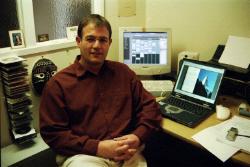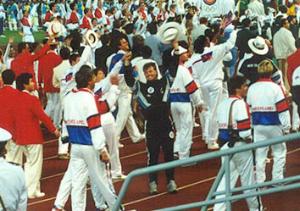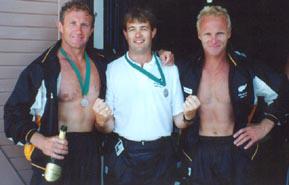![]()
THE PRO-FILE
THE PERFORMANCE OF CHAMPIONS (Part One)
 Mark Sutherland |
I met Mark Sutherland on a Qantas flight from Auckland to Sydney in July 2001. We talked for two hours about the commonalities of the performance process. He trains athletes, I train actors. As a coach Mark Sutherland can lay claim to 3 Olympic medals and 4 World Championship medals in kayaking, plus 3 World Championship titles in Surf Ski, Ice Skating and Squash. When he saw the quote about actors on the second page of The Rehearsal Room website, Mark commented that exactly the same was true for athletes. We recorded this interview on September 7th, 2001 in Auckland, New Zealand. This interview, the first of two parts, provides insight into - what makes a champion and the universal ingredients of the performance process. Mark trains champions. His process is focused on producing the optimum results. |
Richard: What are the ingredients that make a good performance?
Mark: Well I have thought about that a lot, actually. (He laughs) I think there is an attitude profile and the attitude profile is this:-
The best athletes in the world are very astute people - they see lots of opportunity all the time. They see opportunity to perform better, they see opportunities to beat their opposition (so they're smarter) and they are also thinkers - they think deep, they think long and they think 'outside the square'.
They trust themselves - so they have this thing which we call CONCENTRATION, CONFIDENCE, COMPOSURE. They…
- Concentrate strongly on what they've got to do
- Until they feel confident that they can do it
- And then they are very composed when they do it, so they don't make mistakes.
These are the components of trust.
They are inspirational - so they pat themselves on the back all the time. They inspire themselves. They want to win gold medals. They want to be the best. They want to be world champions.
Richard: So how does patting yourself on the back make you a World Champion?
 Mark: Well if YOU don't pat
yourself on the back who the hell else IS. No one is going to
do it for you. My athletes all keep training diaries and each
day they have to write down what their goals are … they
tick the goals they have achieved but they also have to write
down all the other achievements they have managed in that day
as well. If you are a golfer you may win one professional tournament
in your whole life.
Mark: Well if YOU don't pat
yourself on the back who the hell else IS. No one is going to
do it for you. My athletes all keep training diaries and each
day they have to write down what their goals are … they
tick the goals they have achieved but they also have to write
down all the other achievements they have managed in that day
as well. If you are a golfer you may win one professional tournament
in your whole life.
What keeps you going back out there? You've got to see some success somewhere. You get one shot at an Olympic Games… young Peter Evden is an archer. By the time he gets to the 2008 Olympics he will have done 16,000 hours of training for a 10 minute final - should he make the final? So how do you keep yourself motivated for 16,000 hours of training? You've got to pat yourself on the back… you've got to look at all the successes you are creating.
Richard: In a very ordinary days activity what might they list as their achievements?
Mark: Well they quantify them or qualify them. So for example Peter may have shot with better technique. For example yesterday we worked on… he was getting his arm to stay stronger in a straight out position, where he is holding the bow right out in front of him. He was struggling with that the other day but yesterday he had immediate success because the arm was stronger. He shot scores that were 56 and 57 were as the other day they were 49 and 50. So straight away he shot six shots better over thirty-six sets … that's a hell of a lot of points if you add all those numbers up. So that's exciting. So there are lots of little things. And we look to add up lots and lots of little things and that makes the big thing. He has the World Champs in a week and a half's time. So the more success he sees in all the little points he is doing.. and the little movements he is doing better than before… then the more inspired he stays with himself and he keeps going 'cos he is more motivated.
So inspiration is a big part of it.
Then the next part of the attitude profile is that they are very tenacious, they just don't give up. Champions never give up. They are very tenacious. They just keep working and working, working until they get it right. They almost want it to be perfect but perfection is very hard to find.
They are universal. This means that they can adapt, very well to any environment that gets thrown at them. They will adapt to sleeping on the floor and they'll adapt to sleeping on a bed. They are very much at home in a first class hotel and they are very much at home in a cheap $20 a night sports school on a hard crib. So they adapt and they adapt to all environments very well. So they are universal people.
They are incredibly dynamic people, I find. That is they make dynamic things happen. They want it to be exciting. They will dress in a way to make people look at them because they are out there trying to get the edge over their opposition all the time.
And the last thing about the attitude profile is they are incredibly energized. They are busting to make it work so they have bundles of energy.
On top of that you have the usual - the passion, the persistence and all that sort of stuff but I think that the one key thing that separates the champion from someone who wants to be a champion is this … and this is my own quote… and I totally believe it "Great champions are never surprised by their victory. They plan for it. They expect it."
 Richard: When the athlete is
out there about to participate in the event what are the ingredients
which will make it happen?
Richard: When the athlete is
out there about to participate in the event what are the ingredients
which will make it happen?
Mark: That's simple. Everything that has gone on before that point in time. If they have done everything right then its just another day at the office.
They don't get buzzed out by the fact that there is a huge crowd there. They don't get buzzed out by the fact that this is one race. It's just 'another day at the office' because the great champions have rehearsed that race many, many, many times. So they just put themselves into a frame of mind that "This is what I'm here to do." "This is what I do naturally. It's what I have done every day for the last four or eight years." "It's just 'another day at the office' except that there are a whole bunch of guys doing it with me today." Certainly, the champions that I have coached, that's exactly how they have approached it. You have your usual nerves. But they have nerves before every race. So the nerves aren't a shock they're used to that.
There are two kinds of nervousness.
- There are nerves 'cos you're really prepared
- And there's nerves 'cos your not prepared.
If you're nervous because you're under-prepared you ain't going to win. But if you're nervous because you've got a chance - then you're IN. So it's a matter of making sure you've got the right nerves on the right day.
Richard: And that is purely to do with… preparation
Mark: Preparation. Yeah
Richard: If you were going to speak to an athlete before an event what would be the last thing you say?
Mark: No…nothing.
Richard: You don't need to.
Mark: No. You don't need to, if you've done it right. You hear about pep talks and giving teams pep talks, but pep talks can screw up an athlete as much as they can help an athlete. What ever the system is that you have in place - your pre-competition preparation plan you just stick to it. A lot of athletes don't need a pep talk. They know what they've got to do. They know what is going to take place. They just need to know that what they rehearsed will take place… that it is going to work and that it will stay the same that day. KEEP EVERY THING THE SAME - so having the media shoving microphones in your face…they don't have that on rehearsal day, so lets not have it on competition day. That's all right afterwards but not beforehand.
If they eat one kind of food for breakfast, that's what they want to eat for breakfast. If they get a certain time to warm up they want to make sure they get that long to warm up.
|
Richard: They keep the routine. Mark: The bottom line is that the routine has been set. You have been living like this for three months. You don't want to upset this 'cos you are only five days away from an Olympic final. So you stay in the routine as much as you can. Richard: And this is to maintain a comfortable process? Mark: Yeah! Steady. Richard: So it's about maintaining comfort and steadiness. |
 Mark Sutherland at the Olympic closing ceremony 1988. |
Mark: It's just keeping yourself on track, you know.
Richard: So being comfortable with yourself?
Mark: Absolutely. Being comfortable in your surroundings…..
Richard: Relaxation can be a significant factor in improving an actor's performance is that a factor for the athlete.
Mark: I think it is. For some athletes it's extremely important and for other athletes it's not a major thing. Because if they are in the right zone all the time they don't need to relax because they are always in a comfortable zone. The whole idea of creating things which have to be done .. on the day or the day before … is …you know? Keep everything normal. It's like nutrition. Keep everything normal. Eat the same foods all the time, in the same quantities and so on.
Richard: So they've achieved the relaxation by maintaining the …
Mark: By maintaining the routine.
Richard: Right.
Mark: And some times you do get the freak out….I mean… "Holy shit this is the World Championships". But then there you always make sure you are prepared for that too. There are things that you will do to help them relax. But the things that they do to relax and to calm down, for say maybe sleep … are not the things they should do to get themselves aroused for competition. You have to have the right methods for the right time to produce the right results.
Richard: What I have observed with actors is that the tension of wanting to be good can actually destroy the performance.
Mark: Well we have that in sport as well and the key thing is that if you're in a movie or a TV show or getting ready for the Olympic stage then you are already good. Understand that. Know it. That's part of the inspiration. Know you are good. Pat yourself on the back don't be afraid of knowing that you are good. That's why you are there for goodness sake. Russell Crowe is there believing he is the best. And he has no problem with his ego. That's why they are the super stars. Some of them are modest but most people that are really good, know they're good.
Though sometimes you have to pick yourself up if you are feeling a bit down … if you wake up and don't feel great that morning … you've got to have methods you use to over come these…
Richard: So what are the methods you use to pick yourself up?
 Ian Ferguson and Paul Macdonald with Mark (centre) - World Champions, Poland, 1990 |
Mark: One of the first things to do is to go back over your training diaries and look at all the success that's happened. Look at all your time trials. Look at all your previous results. Look at a day when you felt like this before and what we did … especially if a little bit of self-doubt is starting to creep in.That's when we just look back at all the successes and achievements that are in the training diaries. 'Cos one of the big things to write down is all the achievements. And there's a reason for that. |
Look back - "I've had fourthousand million trillion achievements and I've only had five or six really bad failures - so it's in my favour." You know…? You're just been smart about it. And then go through all your processes. Have you done this? "Yes" - Have you got this sussed? "Yes." So you get as many "Yes" answers as you can. As many positive answers as you can to all the questions. And before long you have talked yourself into being back on track again.
But that can only happen if the training process has been spot on. And so that's got to be worked at all the time.
 Do
you keep an actors diary? Do you list your successes? Does it
address training issues? Do you analyse your training process?
What are you doing to extend your skills? Do you aim to have
your next audition or gig function as 'just another day at the
office' so that you can allow your well-trained process to work
at its peak level?
Do
you keep an actors diary? Do you list your successes? Does it
address training issues? Do you analyse your training process?
What are you doing to extend your skills? Do you aim to have
your next audition or gig function as 'just another day at the
office' so that you can allow your well-trained process to work
at its peak level?
NEXT: In part two of this interview with Mark Sutherland - we discuss "What makes a good training programme?" Plus "How to plan a path to your goals?" And Mark explains how and why he bought the Mercedes.
< BACK TO THE PRO-FILE
INTRO | ABOUT | WORKSHOPS & CLASSES | TESTIMONIALS | LATEST NEWS | WORKING ACTOR
GREENROOM | DIRECTOR'S NOTES | QUOTARIUM | DIARY | OFF-CUTS | AUDITIONS | CONTACT
All contents copyright © The Rehearsal Room unless othewise stated
|
|
|
|
||||||
|---|---|---|---|---|---|---|---|---|
|
|
|
|
||||||
|
|
|
|